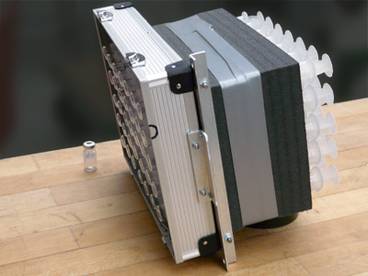chemical signalling in roots under microgravity conditions (Falling Roots)

research area: biology
experiment title:
Chemical Signalling in Roots under Microgravity Conditions
(Falling Roots)
experiment acronym: DYT
funding agency:
ESA (Education) / ZARM
grant number:
Drop Your Thesis! - Program
performing organization:
Department of Plant, Soil and Environmental Science, University of Florence, Italy
prime investigator:
Prof. Dr. Stefano Mancuso
(Diego Comparini, Emanuela Monetti, Elisa Masi, Elisa Azzarello)
experiment objective
abstract
Plants have evolved under the constant force of gravity and its presence strongly influences growth and development of plants. For this reason, changes in gravitational field strength, both hypergravity and microgravity, can be considered as a source of stress that is initially perceived at root level and transmitted by signalling chains to the other organs in order to adapt plant physiology to these changes. For this reasons, plants are particularly suited to study the response of a living organism to gravity as they are extremely sensitive to any changes in this parameter. When under the stress of microgravity, plants appear to exhibit improved oxygen consumption; this response is postulated to be linked with an oxidative burst, a rapid, transient, production of huge amounts of reactive oxygen species (ROS), which have previously been detected in the apices of plant roots undergoing parabolic flights. These compounds are considered an important signalling molecules in plants that mediates many developmental and physiological processes. The aim of the project is to evaluate the production of reactive oxygen species, focusing on nitric oxide, in maize root apices subjected to a short period of microgravity.
In this experiment, several roots have been fixed, together with water, in an array of syringes. The experimental setup was placed in a capsule and suspended at the top of the ZARM drop tower. A few minutes prior to the drop, a plunger depressed several syringes, and control samples were collected in small containers. These control samples were used to determine the level of reactive oxygen species (ROS) production in roots that have been subjected to all of the same conditions as the test samples, except for microgravity. The capsule was then dropped. After 3.5 seconds of free fall, a second plunger has been depressed the remaining syringes expelling the water and all materials excreted by the roots into small sample containers. Due to the reactive nature of ROS, dry ice has been used to keep both the test and the control samples cold and to rapidly block all reaction processes. The production of molecules involved in early stress signalling under microgravity conditions in plants has been obtained through the comparison of the concentration of these compounds in the test samples with that in the control samples.
related publications
- Chemical Signalling in Roots under Microgravity Conditions (Falling Roots), Drop Your Thesis! 2011 - Final Report. ESA Human Spaceflight and Exploration, Erasmus Experiment Archive
experiment campaigns
experiment year: 2011
number of drops: 5


 "
"